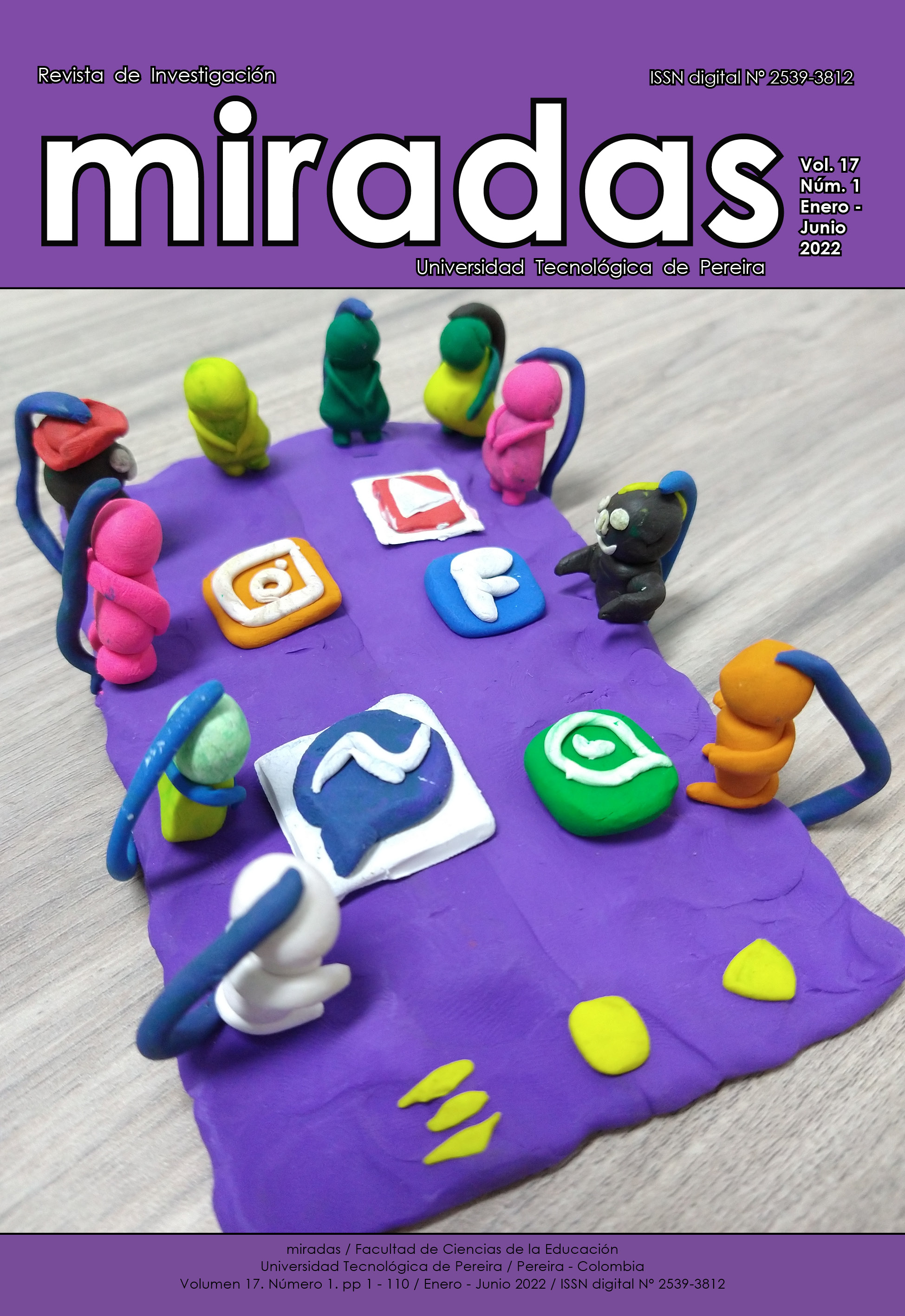The narrative research in education
DOI:
https://doi.org/10.22517/25393812.25052Abstract
Narrative research has created an interest in the last three decades in how to investigate and interpret realities, since narration is understood as an epistemological, ontological and axiological condition of social life and, in turn, as a method of interpretation, knowledge, creation and analysis. Also, the stories are a glimpse into cultural and identity constructions. For that, you must ask about the meaning of narration in lives and the role that listening plays in this whole process. On the other hand, narrative research is understood as a
dynamic and multiscale tool that claims (and recovers) experiences, in such a way that this notion takes importance because it addresses the characteristics of the subjects in contexts and contributes to the granting of meanings to their own lives. In this way, a different argument is created in the face of positivist, causal, probabilistic and effective positions that have enveloped the construction of pedagogical knowledge. On the other hand, the exercise carried out in this article is the result of a process of inquiry, reflection and writing carried out in the subject Electiva interdisciplinar: redacción científica. The question that led to the construction of the text revolved around the following: Why narrative research in education? This in order to develop two moments: 1) written speech and 2) a reflection on new ways of researching in education. Finally, the text also aims to conceptualize to have a clarity of the challenges and scope that narrative research can carry out in education.
Downloads
References
Bárcena, F. (2005). La experiencia reflexiva en educación. Barcelona: Paidós.
Barrera-Quiroga, D. M. (2019). La investigación narrativa de saber pedagógico: una perspectiva sociocultural. Cuadernos de Lingüística Hispánica, (35), 199-220. Recuperado de https://revistas.uptc.edu.co/index.php/linguistica_hispanica/article/view/10238/ 9211
Barrera-Quiroga, D. M. (2021). El viaje narrativo para el derecho: aproximación conceptual. Revista Justicia, 26(40), 30-44. DOI: https://doi.org/10.17081/just.26.40.4971
Bitonte, A. M. (2008, septiembre) Huellas. De un modelo epistemológico inicial. Ponencia presentada en la III Jornada “Peirce en Argentina”, Buenos Aires, Argentina. Recuperado de https://www.unav.es/gep/IIIPeirceArgentinaBitonte.html
Bolívar, A. (2002). “¿De nobis ipsis silemus?”: Epistemología de la investigación biográfico-narrativa en educación. Revista Electrónica de Investigación Educativa, 4(1), 1-26. Recuperado de http://www.scielo.org.mx/pdf/redie/v4n1/v4n1a3.pdf
Blanco, M. (2011). Investigación narrativa: una forma de generación de conocimientos científicos. Argumentos (México, DF), 24(67), 135-156. http://www.scielo.org.mx/scielo.php?script=sci_arttext&pid=S0187- 57952011000300007
Breton, H. (2021). La indagación narrativa, entre la duración y los detalles (Traducción de Alba Fede Requejo). Revista Argentina de Investigación Narrativa, 1(2), 25-36. Recuperado de http://fh.mdp.edu.ar/revistas/index.php/rain/issue/viewIssue/262/158
Bruner, J. (1996). Realidad mental y mundos posibles. Traducción de Beatriz López. Barcelona: Editorial Gedisa.
Carter, K. (1993). The place of story in the study of teaching and teacher education. Educational researcher, 22(1), 5-18. DOI: https://doi.org/10.3102%2F0013189X022001005
Fernández, R. (2022). La narración y la ficción en la investigación educativa y pedagógica: relaciones y límites disciplinares. Márgenes Revista de Educación de la Universidad de Málaga, 3(1), 7-24. DOI: http://dx.doi.org/10.24310/mgnmar.v3i1.12019
Gómez, E. J. H. (2013). La investigación de la subjetividad: entre la ficción y la verdad. En C. Piedrahita, Á. Díaz y P. Vommaro (comps.), Acercamientos metodológicos a la subjetivación política: debates latinoamericanos (pp. 31 - 49). Bogotá: Universidad Distrital Francisco José de Caldas; CLACSO.
Gómez, L. M. T. y Vinasco, C. C. (comps.) (2020). La voz del estudiante en la educación superior: un mundo por descubrir. Bogotá: Ediciones Uniandes.
Goodson, I. (2017). El ascenso de la narrativa de vidas. Revista Investigación Cualitativa 2(1), pp. 27-41. DOI: http://dx.doi.org/10.23935/2016/01033
Kindt, T. (2009). Narratological expansionism and its discontents. En S. Heinen, R. Sommer (eds.) Narratology in the age of cross-disciplinary narrative research (pp. 35-47). Berlín: Walter de Gruyter.
Lozano, B. R., Pineda, O. M., Rivero, F. R. y Vergara, T. A. (2016). Mi maestra – Mi maestro, historias de vida (tesis de maestría). Universidad Santo Tomás, Bogotá, Colombia.
Mitchell, W. J. T. (1981). On narrative. Chicago: University of Chicago Press.
Molano, A. (1998). Mi historia de vida con las historias de vida. En L. Thierry, P. Vargas y L. Zamundio (coords.), Los usos de las historias de vida en las ciencias sociales (pp. 102-111). Barcelona: Anthropos.
Molano, A. (2017). Trochas y fusiles. Bogotá: Penguin Random House Grupo Editorial.
Murillo, A. G. J. (comp.). (2015). Narrativas de experiencia en educación y pedagogía de la memoria. Buenos Aires: Editorial de la Facultad de Filosofía y Letras Universidad de Buenos Aires.
Murillo, A. G. J. (2016). La investigación biográfico-narrativa en educación en Colombia siglo XXI (tesis de doctorado). Universidad de Antioquia, Medellín, Colombia.
Nieto, J. E. S. y García, N. B. (2017). El aprendizaje de la escucha en la investigación educativa. Qualitative Research in Education, 6(3), 303-326. DOI: http://dx.doi.org/10.17583/qre.2017.2783
Rivas-Flores, J. I., Márquez-García, M. J., Leite-Méndez, A. y Cortés-González, P. (2020). Narrativa y educación con perspectiva decolonial. Márgenes, Revista de Educación de la Universidad de Málaga, 1 (3), 46-62. DOI: https://doi.org/10.24310/mgnmar.v1i3.9495
Ríos, T. (2015). Narración, dialogicidad y acto de escucha en la escuela: hacia una pedagogía comunitaria. Revista Latinoamericana de Estudios Educativos, 11(2), 16-46. Recuperado de https://www.redalyc.org/pdf/1341/134146842002.pdf
Sparkes, A. y Devís, J. (2018). Investigación narrativa y sus formas de análisis: una visión desde la educación física y el deporte. Recuperado de https://revistas.udea.edu.co/index.php/expomotricidad/article/view/335323
Tusón, V. A. (1997). Análisis de la conversación. Barcelona: Editorial Ariel.
Downloads
-
Vistas(Views): 2477
- PDF (Español (España)) Descargas(Downloads): 1703



